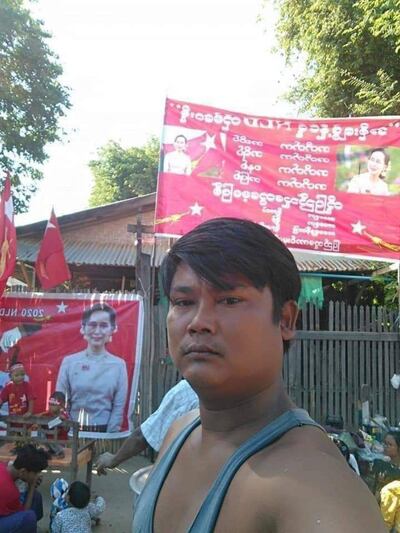The U.S. government on Friday announced new sanctions targeting Myanmar nationals and entities with ties to the country’s military regime, which has violently suppressed protests in the wake of its February coup, and vowed to take additional actions unless the junta agrees to step down from power.
The Department of Treasury blocked the assets of 22 individuals connected to the regime, including three members of the junta, known as the State Administration Council (SAC), and four military-appointed cabinet members, as well as 15 adult children or spouses of previously designated military officials whose financial networks the State Department said in a statement had “contributed to military officials’ ill-gotten gains.”
Additionally, the Department of Commerce added Wanbao Mining, Ltd., two of its subsidiaries, and King Royal Technologies to its list of entities it says provide revenue and other support to Myanmar’s military. Wanbao and its subsidiaries have also been implicated in labor and human rights violations, including at the Letpadaung copper mine.
“Today’s measures further demonstrate that we will continue to take additional action against, and impose costs on, the military and its leaders until they reverse course and provide for a return to democracy,” the State Department said.
“The United States is committed to promoting accountability for the Burmese military, the SAC, and all those who have provided support for the military coup.”
The State Department urged the junta to implement a five-point consensus agreed to by members of the Association of Southeast Asian Nations (ASEAN) during an emergency summit in April to end its campaign of violence in Myanmar and immediately restore the country’s path to democracy.
Friday’s sanctions follow similar ones in May, in which the U.S. Treasury Department froze the assets of 13 military regime figures, specifically citing the “violence and repression” against civilians in the western town of Mindat, where the army used heavy artillery and helicopter gunships against ethnic Chin militia fighters.
Myanmar’s military overthrew the country’s democratically elected civilian government on Feb. 1 and has violently cracked down on widespread protests. Military leaders say a landslide victory by the ousted National League for Democracy (NLD) in the country’s November 2020 elections was the result of widespread voter fraud but have yet to produce any evidence of their claims.
Security forces have killed at least 888 people and arrested, charged or sentenced 5,173 in the five months since the takeover, according to the Bangkok-based Assistance Association of Political Prisoners (AAPP).
The junta has also moved to assert control of the country’s remote ethnic regions, taking on a host of local People’s Defense Force (PDF) militias with its own troops and the help of paramilitary groups that support its rule. Some 230,000 people have been displaced by the clashes, according to the United Nations and aid groups.
They join the more than 500,000 refugees from decades of military conflict between the government military and ethnic armies who were already counted as internally displaced persons at the end of 2020, according to the Internal Displacement Monitoring Center, a Norwegian NGO.

Civilian deaths in custody
At least 28 civilians have been tortured to death by the authorities during interrogations in detention since the coup d’état, according to investigations by RFA’s Myanmar Service—the latest of whom were two men in their 30s from the country’s Bago and Sagaing regions.
On Thursday, authorities informed the family of 34-year-old Soe Min from Bago’s Pyay township of his death three days after his arrest for allegedly “destroying a school,” according to the man’s friend, who spoke on condition of anonymity citing fear of reprisal.
“When the body was brought home, several injuries were apparent—like those caused by being beaten with an iron rod—and it looked like he had died days earlier,” the friend said, adding that there was also a long incision that had been stitched up along the abdomen.
On Friday, police returned the dead body of 39-year-old Aung Zaw Myo from Sagaing’s Monywa township to his family following his detention in connection with a bomb blast at an industrial zone in the area a day earlier. Authorities told family members that Aung Zaw Myo, who had been healthy when he was arrested, died about five hours after being taken into custody.
An anti-junta activist told RFA that the military had likely tortured the detainees to death.
“We feel sorry for our comrades. Many have died at their interrogation camps,” said the activist, who also declined to be named.
“These deaths should not have happened … They can’t do this sort of thing within any legal framework. It’s completely fascist.”
Others who have died in police and military custody include former NLD officials and members, a poet, and several other civilians from around the country.
High Court lawyer Kyee Myint told RFA that the military has enjoyed total impunity since repealing basic protections for the country’s citizens in mid-February.
“There is no longer any rule of law in the country … They can arrest you, hold you in a cell for more than 24 hours, kill you—anything,” he said.
“Under the Citizens’ Protection Act, you could litigate against such unlawful arrests. You could sue a police commander if he refused to open a case. These kinds of laws have all been repealed. The military is ruling the country by amending laws however it wants. That is why the country is suffering.”
Reported by Myanmar Service. Translated by Khin Maung Nyane. Written in English by Joshua Lipes.
